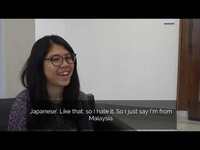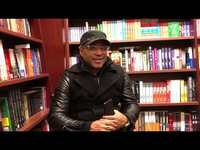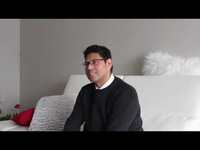Items
Tag
Language
-
 Bridging Community & Culture: Mosaic Cultural Identity Syarifah Nur Fathima is a Japanese International student of Malaysian descent who was born and raised in Tokyo, Japan. She came to Canada 2 years ago (September 2017) and has since been volunteering at the London Japanese School and acting as a TA for Professor Mitsume Fukui here at Western. In Japan, she studied Japanese Literature and Culture at Musashino University. For her graduate at Western, she completed an English Teaching program for International students in order to further develop her English-speaking skills. She just recently graduated and hopes to find work in London before returning to Malaysia. There she hopes to secure a career teaching Japanese while utilizing her polylingual skills.
Bridging Community & Culture: Mosaic Cultural Identity Syarifah Nur Fathima is a Japanese International student of Malaysian descent who was born and raised in Tokyo, Japan. She came to Canada 2 years ago (September 2017) and has since been volunteering at the London Japanese School and acting as a TA for Professor Mitsume Fukui here at Western. In Japan, she studied Japanese Literature and Culture at Musashino University. For her graduate at Western, she completed an English Teaching program for International students in order to further develop her English-speaking skills. She just recently graduated and hopes to find work in London before returning to Malaysia. There she hopes to secure a career teaching Japanese while utilizing her polylingual skills. -
 Creating Identity through Music This portrait demonstrates through various music clips, the integration of music and the importance in my partners life. Through being from a family of doctor’s in Havana, being the only musician enabled him to attend school for “free” in Cuba after being 1 of 6 chosen. Through participating in a program that enables him to arrive in Canada, and for a fee that is to be paid back to the government, is able to play concerts in Canada. He speaks about how the connection of music amongst different composers, no matter the sound or instrument, is a family and a connected language. He represents his identity through the constant listening and incorporating of music into his saxophone, drums, and piano gigs, alongside dj’ing at various clubs within London. Through tailoring his music towards the cultural crowd, and being able to adapt and fit in with the crowd with unique and current songs, brings forward the ability for various cultural groups to feel connected through the language of music. A universal language.
Creating Identity through Music This portrait demonstrates through various music clips, the integration of music and the importance in my partners life. Through being from a family of doctor’s in Havana, being the only musician enabled him to attend school for “free” in Cuba after being 1 of 6 chosen. Through participating in a program that enables him to arrive in Canada, and for a fee that is to be paid back to the government, is able to play concerts in Canada. He speaks about how the connection of music amongst different composers, no matter the sound or instrument, is a family and a connected language. He represents his identity through the constant listening and incorporating of music into his saxophone, drums, and piano gigs, alongside dj’ing at various clubs within London. Through tailoring his music towards the cultural crowd, and being able to adapt and fit in with the crowd with unique and current songs, brings forward the ability for various cultural groups to feel connected through the language of music. A universal language. -
 Breaking Boundaries: From Guatemala to Canada. How we share similarities, regardless of location. In this portrait, Juan Carlos Parada explains his definition of culture and provides his audience with anecdotal references to create a vibrant portrayal of his cultural background. Reminiscing on his immigration to Canada, Juan Carlos tackles the hardships of being a minority experienced by both himself and his parents. He points out his core belief of how although each culture may have superficial differences, once one looks past those differences, every individual has similarities that bring them together. In addition, Juan Carlos opens up about misconceptions associated with his culture, based on his own experiences, and concludes his story with ways to overcome stigmas. In conclusion, although Juan Carlos narrates this story through his own experiences, this portrait is one that can resonate with many people once they seek to look past differences.
Breaking Boundaries: From Guatemala to Canada. How we share similarities, regardless of location. In this portrait, Juan Carlos Parada explains his definition of culture and provides his audience with anecdotal references to create a vibrant portrayal of his cultural background. Reminiscing on his immigration to Canada, Juan Carlos tackles the hardships of being a minority experienced by both himself and his parents. He points out his core belief of how although each culture may have superficial differences, once one looks past those differences, every individual has similarities that bring them together. In addition, Juan Carlos opens up about misconceptions associated with his culture, based on his own experiences, and concludes his story with ways to overcome stigmas. In conclusion, although Juan Carlos narrates this story through his own experiences, this portrait is one that can resonate with many people once they seek to look past differences.